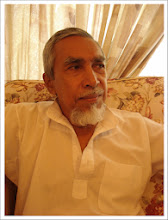1. Time, in essence, dominates our quest for a better
awareness of a man long obscured in time. What memories I have of him have gone
hazy with the passing of time.
2. During my childhood he was in his late 60s. I was nine when
he passed away in 1956. I dimly remember being among the crowd attending his
funeral at the cemetery.
3. I was in my mid-60s, about 57 years after his passing, when
his grandchildren i.e. the children of my siblings and my own children – began
to show a keen interest in their grandfather. This marked the beginning of a
quest that would become a family pastime.
4. Prior to the quest I knew so little about my father: M. I.
Merican. However, even during my younger days I seemed to realize that he used
to be an important person in the State of Kedah. A few village elders I had
been acquainted with at the time regarded him with much respect. Very much
later I learned that he used to be Headmaster, Superintendent of Education and
Legal Adviser.
5. It goes without saying that I knew almost nothing of his
roots except that family members on his side were said to be rich Tanjong
people. This I learned from my mother’s infrequent story about my father.
6. There would be no better places like archives and libraries
to start our quest. They provide storage for records, documents and all sorts
of printed matter which would otherwise have perished with the passing of time.
7. Occasionally we would spend long hours at those wonderful
places particularly the National Archives of Malaysia (Archives) and the Penang
Public Library, Seberang Jaya (Library) to look for relevant materials. Librarians,
archivists and clerks of those institutions were most supportive in our search
for information pertaining to our subject.
8. Thus far our combined effort has considerably borne fruit.
I took pleasure in writing accounts of our discoveries and publishing them in
my blog “Occasional Jottings by M S Marikan.”
9. Our perusal of numerous accounts led us to trace our
lineage to a famous 19th century Penang merchant, Mohamad Merican Noordin, immortalized in one of Georgetown’s street
namely Lebuh Noordin (Noordin Street), named after him. His eldest son whose
name was written as Vappoo Marikan Nordin in my birth certificate – was also a well-known merchant in
his own right.
10. As regards names, it was confusion. In books and old
newspapers the name ‘Vapoo’ was written with either a single or a double ‘p.’
‘Bapu’ was also commonly used.
11. Going through official documents in the Archives my father
had at least eight variations by which his name
was written or typewritten. He wrote his name ‘Md. Ismail Merican.’ However, it
was printed ‘Che Mohamad Ismail Merican’ in his death certificate.
12. In any case, the surname ‘Merican’ was consistently used
in names that we found in books, documents and newspapers. However, mine and my
late brother’s was spelt in Malay – ‘Marikan.’
13. Thus it seems complicated and futile for the children of
my late brother, for my sister and for me to claim our lineage to the “Noordin
clan.” Thus, we stay
estranged from our lineage for want of concrete proof of identity.
14. One thing leads to another. My children and their cousins would
not accept that the spelling of my surname in Malay was “accidental.”
They seemed to believe that it was a consequence of an “intrigue.”
15. The conspiracy theory imagined by their curious minds
would be regarded as unfounded, but how do you explain the “mess” in my sister’s
identity record about two years back. It was purely by chance that she had
found out her binti* was recorded ‘Ismail
Khan’ instead of ‘Ismail Merican’ as in her birth certificate. As regards our
quest, where does this leave us?










